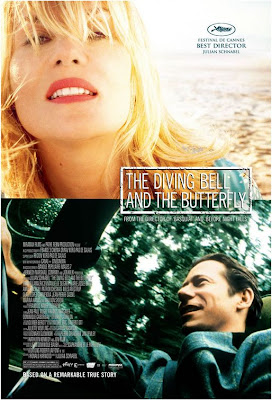
Nowadays, societies are dominated and led by deadlines and work. People live in a frenetic pace which inhibits them from enjoying their lives. Yet ironically, they have lost the concept of time, believing their youth and golden years will last forever, and thus, forgetting that the fragility and volatility of the balance and harmony of their bodies can be damaged and reduced to ashes in an instance. They neither take care nor enjoy the healthy functions of their bodies while they can. This chronic condition of living without being in the moment is the main criticism made to our society by the French film The Diving Bell and the Butterfly, directed by Julian Schnabel and Francois-Xavier Decraene.
The film is based on the novel Le Scáphandre et Le Papillon by Jean-Dominique Bauby, which relates the author’s story shortly before dying. This motion picture is heart breaking and eye opening since it effectively drives the spectator into the insights of being a living vegetable. It is filmed from the prospective of the patient, making the audience live his life for two hours, which afterward, hopefully puts under prospective their own way of facing life.
Baudy was a successful Parisian men. He was the editor of Elle magazine, and was enjoying his single life after having got divorced from his wife and three children. He, as many, thought that he had all the time in the world to fix his mistakes. However, at age 42, he had a massive stroke which led him first into a three-weeks coma, and then into a “looked-in” syndrome, which means that the only functional parts of his body were his brain and his left eye. “My whole body is encased in a kind of diving suit.” Now, the once forgotten biological instinct of blink has become Baudy’s only connection with the outside world. With the assistance of a speech therapist, Baudy learned to communicate his approval or disapproval with a single or double blink, and after a while, he would dictate his thoughts by blinking at the speech therapist’s recital of the alphabet.
Given his condition, his life was a reason of pity because of the insignificance that it was reduced to. However, he defied this share notion by writing a book since, as he said, “other than my eyes two things aren’t paralyzed, my imagination and my memory.” He literally wrote his book in a blink of an eye, he would memorize what he wanted to write, and then blink it to an assistant who would write his thoughts. “My task consists to write the motionless travel notes from a castaway on the shores of loneliness.” His willingness to live was equivalent to Virginia Woolf’s moth, which never gave up its life, it fought for it and got it back for a final goodbye flight that revealed the importance of appreciating our own life, even if it might be insignificant for the rest of the world.
Baudy’s life, after having had the stoke, was an early representation of elderly people’s reality. He did not have the autonomy of deciding things by himself, most of the time he was alone at the hospital, he would feel guilty by seen his family suffering because of his condition and, if his loved ones came to visit him, he would feel ashamed of his appearance.
This movie is a wake up call that helps understand the importance of living the moment instead of the dream of a better future since the only things that are certain in our lives are the past, that we cannot go back to, and the present that we are living today. Moreover, no matter the old age or critical condition we have, the present should never be wasted to wait for death. It should be seen as a gift that has to be enjoyed at its full extension.

No comments:
Post a Comment